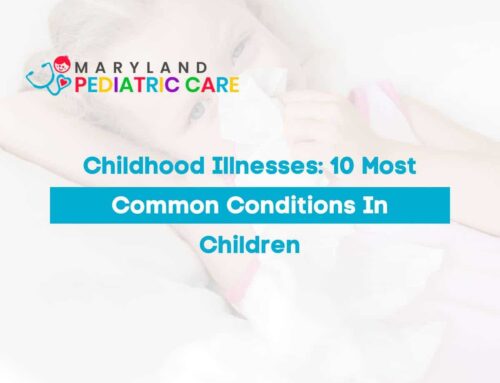Baby Sleep Regressions: An Easy Guide For Parents
Tips For Dealing With Sleep Regression In Babies
Are you struggling with sleep regressions? If so, you’re not alone. Many parents struggle with their babies going through periods where they don’t want to sleep or stay asleep. It can happen at night or during the day.
The American Academy of Pediatrics (AAP) recommends that children should get between 11 and 14 hours of sleep each night. Babies who go through these sleep regressions usually wake up around 3 am and then refuse to fall asleep until morning.
Sleep regressions typically last from 2 to 6 weeks. Most experts agree that sleep regressions are normal and harmless. However, some parents worry that their child isn’t sleeping well enough.
A Germantown pediatrician shared below a brief guide to understanding baby sleep regressions so you can have peace of mind.

What Is Baby Sleep Regression?
Sleep regression is the period when your baby’s sleep patterns change. It happens when a baby sleeping suddenly has issues going back to sleep or wakes up fussing at night.
Fortunately, sleep regression is temporary, and it usually means your baby’s brain is developing. The only problem you may face is stress with your baby’s sleep schedule and yours.
Why Does It Happen?
Many factors can make your baby nervous and restless, leading to sleep regressions. Some common causes are:
- Teeth pain
- Reaching a new developmental stage
- A growth spurt
- Disruptions in their routines
- Traveling
- An illness
How Long Does It Last?
It usually lasts from two to six weeks, although the exact duration varies from baby to baby.
The first sleep regression typically happens when your baby is four months old, and others might occur later. The 4-month sleep regression is often the hardest for many parents, so you are not alone with this one.
While experiencing sleep regressions, stick to your routines and consider sleep training methods if necessary.
Don’t forget to contact a Damascus pediatrician if you think your baby is experiencing sleep regression due to a health problem.
Common Signs Of Baby Sleep Regression
The most common sign is a sudden worsening in sleep patterns at around four months. If your baby was sleeping well at night, but suddenly they are not, they may be experiencing a sleep regression.
Other signs include:
- Frequent night wakings
- Less napping
- Increased fussiness
- Changes in appetite (including more hunger)
When Are Sleep Regressions Common?
Sleep regressions occur at any time because they are linked to unpredictable factors like changes in routines or an illness.
However, there are a few periods when sleep regression is somehow foreseeable due to growth spurts, teething, or reaching new developmental milestones. These periods are:
- Between 3 to 4 months: The 4-month sleep regression is usually the hardest for parents because it’s the first.
- 6-month sleep regression: By this age, babies can sleep deeply through the night, but they may wake simply for snuggles.
- 8 to 10-month sleep regression: Most babies start crawling when they’re 9 or 10 months old, so they may wake up because of excitement. Nonetheless, separation anxiety is another common issue that can wake up your baby at night. Your Gaithersburg pediatrician may recommend you some sleep training methods to make sure your baby sleeps well at night.
- 12-mont sleep regression: Between 9 to 12 months, babies start standing up. In many cases, they take their first steps around the one-year mark. Reaching this precious milestone can cause sleep problems.
Nightmares, night terrors, teething, and separation anxiety can also cause sleep regressions in toddlers, especially at around 18 to 24 months.
How To Manage Baby Sleep Regressions
Luckily, sleep regression is temporary, so you won’t have to worry about it for long periods. These recommendations should help you manage sleep regression successfully:
- Know your baby’s sleep cues like yawning, fussiness, and looking away. These cues can help you know when to get your baby to bed before feeling overtired.
- Keep a consistent bedtime routine. This routine should include dinner, baths, lullabies, and a few comforting words.
- See if your baby is having enough sleep during the day. The naps are as crucial as their night sleeps.
- Give your baby a few minutes to fuss before responding if they suddenly cry at night. If your baby keeps calling, enter the room quietly and quickly to check everything’s okay. Your Germantown pediatric doctor probably has recommended you to avoid rocking or feeding your baby as soon as they cry, so follow that advice. Cuddling, rocking, or feeding your baby at night may encourage them to wake just for attention.
- Consider trying other sleep training methods if necessary.
- Give your baby extra attention during the day and before bedtime to reduce separation anxiety effects.
Contact a Germantown Pediatric Doctor For More Help
If you need more help regarding your baby’s sleep regression, don’t worry, Maryland Pediatric Care can help. Our team of pediatricians is committed to providing personalized medical care for every stage of your child’s development. Contact us now to schedule your appointment!

Maryland Pediatric Care
19525 Doctors Drive,
Germantown, MD 20874
Phone: 301-424-2400
Email: [email protected]
Mon, Tue, Thu, Fri: 8:00am – 5:00pm
Wednesday: 8:00am – 1:00pm
Every second Saturday of month
(9:00am – 11:30Am)





